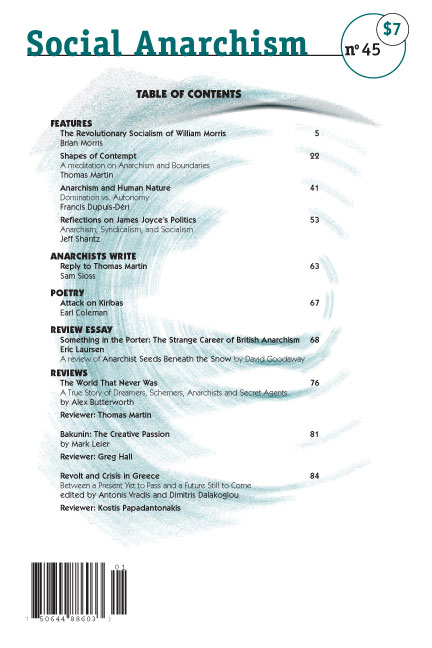Anarchism and Human Nature
Page: 4
Conclusion: Avenues Toward An Anarchist Philosophy Of History
Clearly, the structuralist conception discussed above can give rise to some pessimism among anarchists, the very ones who are chastised for being too optimistic about human nature. Because if the hierarchical structure ultimately determines which humour is expressed, how can we extricate ourselves from an authoritarian structure? Actually, a hierarchical structure causes a reaction (a revolt) based on the principle of or the desire for autonomy, which can surface at any hierarchical level that is subaltern to a higher level (Scott 1992). The preceding discussion on the anarchist conception of human nature therefore makes it possible to identify avenues for the development of an anarchist philosophy of history, whose focus would be the opposition between the principle of domination and the principle of autonomy. To think from a historical perspective would therefore involve tracking through the past the question of power, which can manifest itself as a “power over” (domination) or a “power to” do something for and by oneself (autonomy), individually and collectively.
Seen in this light, history is not a linear process that ultimately leads to anarchy (Adams 2011), but rather a series of situations and events where two principles enter into conflict, thereby shaping social organization. But as this opposition is perpetual, among both individuals and communities, history is not a dialectical process. The opposition cannot be resolved in a system of pacified synthesis, where conflict would no longer exist between the wish for domination and the wish for autonomy. Although Robert Michels “iron law of oligarchy” is quite well known amongst political scientists, the last words of his book, Political Parties, deal with a perpetual struggle between aristocratic and democratic forces :
The democratic currents of history resemble successive waves. They break ever on the same shoal. They are ever renewed. This enduring spectacle is simultaneously encouraging and depressing. When democracies have gained a certain stage of development, they undergo a gradual transformation, adopting the aristocratic spirit, and in many cases also the aristocratic forms, against which at the outset they struggled so fiercely. Now new accusers arise to denounce the traitors; after an era of glorious combats and of inglorious power, they end by fusing with the old dominant class; whereupon once more they are in their turn attacked by fresh opponents who appeal to the name of democracy. It is probable that this cruel game will continue without end (Michels 2001: 245-246).
In the same spirit, Kropotkin (2009: 95) explains the inevitability of a perpetual conflict between domination and autonomy in the following terms: “[T]hroughout the history of our civilization, two traditions, two opposing tendencies have existed: […] the authoritarian tradition and the libertarian tradition.” He adds, “these two currents [are] always alive, always struggling within the human race.” One could hardly describe such as conception of human nature as naïve or optimistic.
References
- Adams, Matthew S. (2011) “Kropotkin: evolution, revolutionary change and the end of history,” Anarchist Studies, 19 (1), pp. 56-81.
- Aron, Raymond (1962) Paix et guerre entre les nations (Paris, Calmann Lévy).
- Barber, Benjamin (1972) Superman and Common Men : Freedom, Anarchy, and the Revolution (New York, Praeger).
- Barclay, Harold (1990) People Without Government (London: Kahn & Averill).
- Barclay, Harold (1997) Culture and Anarchism (London, Freedom Press).
- Brown, L. Susan (1993) The Politics of Individualism (Montreal: Black Rose).
- Clark, John P. (1978) “What is anarchism ?” Nomos, no. XIX.
- De Waal, Frans (2005) Our Inner Ape: A Leading Primatologist Explains Why We Are Who We Are (New York: Riverhead Trade).
- Diani, Mario (2003) “Direct democracy and leadership in social movement networks,” Pedro Ibarra (ed.), Social Movements and Democracy (New York: Palgrave MacMillan), pp. 47-59.
- Duverger, Maurice, Introduction à la politique (Paris: Gallimard).
- Fukuyama, Francis (1998) “Women and the evolution of world politics,” Foreign Affairs, Sept.-Oct..
- Gouzer, J. (circa 1920) Psychologie de l’anarchiste (Paris-Lyon : G. Masson-A. Storck).
- Hartley, David (1995) “Communitarian anarchism and human nature,” Anarchist Studies, 3 (2).
- Joll, James (1980) The Anarchists (Cambridge, Mass.: Harvard University Press).
- Kropotkin, Peter (1924) Ethics: Origin and Development (L. MacVeagh [tr. L. S. Friedland & I. R. Pirozhnikov]).
- Kropotkin, Peter (1927 [5th ed.]) L’éthique (Paris : Stock).
- Kropotkin, Peter (1998) “Are we good enough ?” P. Kropotkin, Act For Yourself : Articles from Freedom 1886-1907 (London: Freedom Press).
- Kropotkin, Peter (2002 [1927]) Anarchism: A Collection of Revolutionary Writings (Mineola, New York: Dover).
- Kropotkin, Peter (2009) L’État — son rôle historique (Marseille: Le flibustier).
- Loye, David (2000) Darwin’s Lost Theory of Love : A Healing Vision for the New Century (New York: toExcel).
- Malatesta, Errico (2004) L’Anarchie (Montréal : Lux).
- Marshall, Peter (1989) “Human nature and anarchism,” David Goodway (ed.), For Anarchism: History, Theory, and Practice ( London-New York: Routledge).
- May, Todd (1994) The Political Philosophy of Poststructuralist Anarchism (University Park, Penn.: Pennsylvania State University Press).
- McKay, Ian, Elkins, Gary, Neal, Dave, Boraas, Ed (circa 2007) What About Human Nature? (pamphlet excerpted from: An Anarchist FAQ [Oakland-Edinburg: AKPress, 1995-2007]).
- Michel, Louise (n.d.) “Voilà pourquoi je suis anarchiste,” Daniel Guérin (ed.), Ni dieu ni maître : Anthologie historique du mouvement anarchiste (Lausanne: La Cité).
- Michels, Robert (2001) Political Parties (Kitchener [Ontario]: Batoche Books).
- Miller, David (1984) Anarchism (London and Melbourne: J.M. Dent & Sons ltd.).
- Reclus, Élisée (2001 [1898]) Évolution, révolution et idéal anarchique (Paris: Éditions Phénix).
- Sahlins, Marshall (2008) The Western Illusion of Human Nature: With Reflections on the Long History of Hierarchy, Equality and the Sublimation of Anarchy in the West, and Comparative Notes on Other Conceptions of the Human Condition (Chicago: Prickly Paradigm Press).
- Scott, James C. (1992) Domination and the Art of Resistance : Hidden Transcript (New Haven [CT]: Yale University Press).
- Suissa, Judith (2010) Anarchism and Education: A Philosophical Perspective (Oakland: PM Press).
- Wilson, Charlotte (2005 [1886]) “Anarchism,” Robert Graham (ed.), Anarchism : A Documentary History of Libertarian Ideas (Montreal: Black Rose Books).
- Wolff, Jonathan (1996) Introduction to Political Philosophy (Oxford: Oxford University Press).

